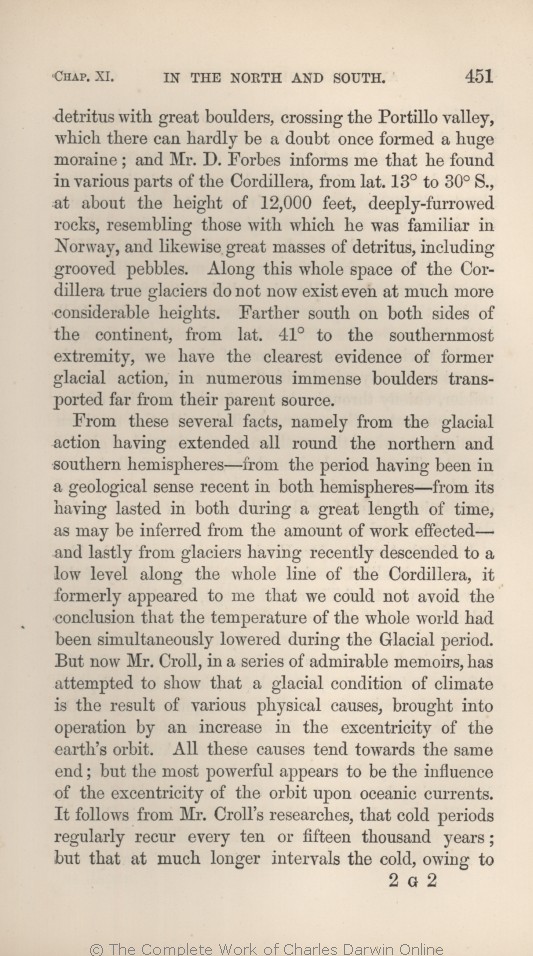a vast mound of
detritus | detritus 1866 1869 1872 | | detritus, 1859 1860 1861 |
| with great boulders, crossing the Portillo valley, which there can hardly be a doubt once formed a huge moraine; and Mr. D. Forbes informs me that he found in various parts of the Cordillera, from lat. 13° to 30° S., at about the height of 12,000 feet, deeply-furrowed rocks, resembling those with which he was familiar in Norway, and likewise great masses of detritus, including grooved pebbles. 1869 |
| about 800 feet in height, crossing a valley of the Andes; and this I now feel convinced was a gigantic moraine, left far below any existing glacier. 1859 1860 |
| with great boulders, crossing the Portillo valley, which there can hardly be a doubt once formed a huge moraine; and Mr. D. Forbes informs me that he found in various parts of the Cordillera, from lat. 13° to 30° S., at about the height of 12,000 feet, deeply-furrowed rocks, resembling those with which he was familiar in Norway, and likewise great masses of detritus, including grooved pebbles. 1872 |
| Farther 1861 1866 1869 1872 | | Further 1859 1860 |
| 41° 1866 1869 | | 41° 1859 1860 1861 1872 |
| numerous immense 1869 1872 | | huge 1859 1860 1861 1866 |
| from 1859 1860 1861 1869 1872 |
| former glacial action, in huge boulders transported far from 1866 |
|
From these several facts, namely from the glacial action having extended all round the northern and southern hemispheres— from the period having been in a geological sense recent in both hemispheres— from its having lasted in both during a great length of time, as may be inferred from the amount of work effected— and lastly from glaciers having recently descended to a low level along the whole line of the Cordillera, it
formerly | formerly 1869 |
| at one time 1872 |
| excentricity 1869 | | eccentricity 1872 |
| influence 1869 | | indirect influence 1872 |
| excentricity 1869 | | eccentricity 1872 |
| It follows from 1869 |
| According to 1872 |
| researches, that 1869 | researches, that 1872 |
| but that at much longer intervals the cold, 1869 |
| and these at long intervals are extremely severe, 1872 |
|









